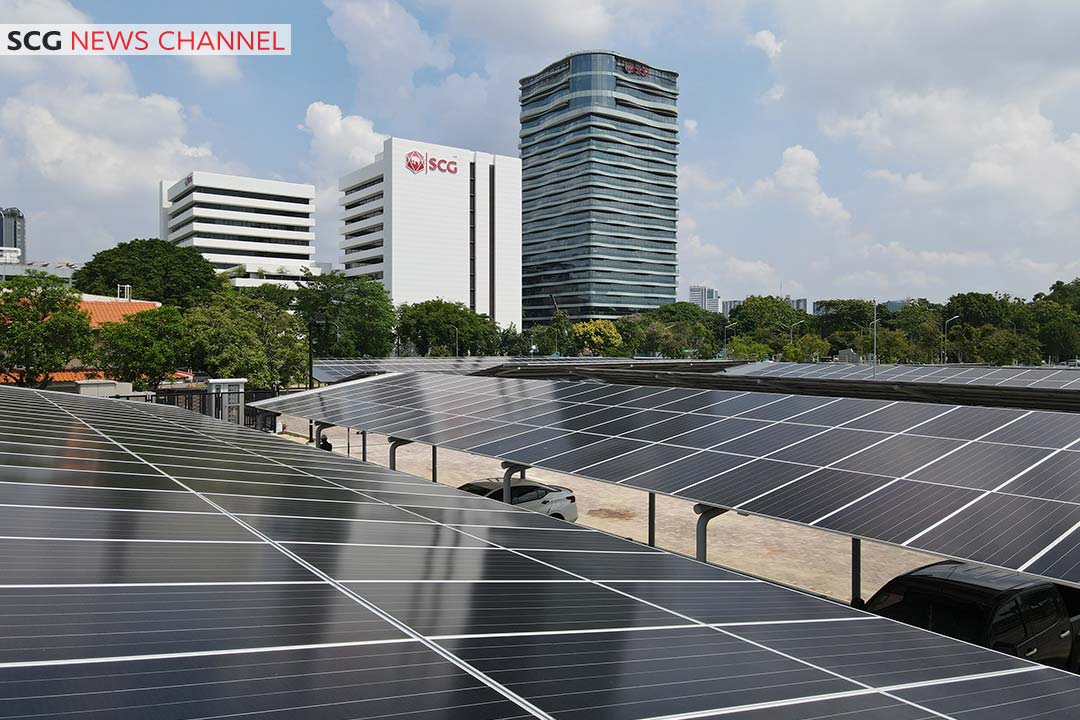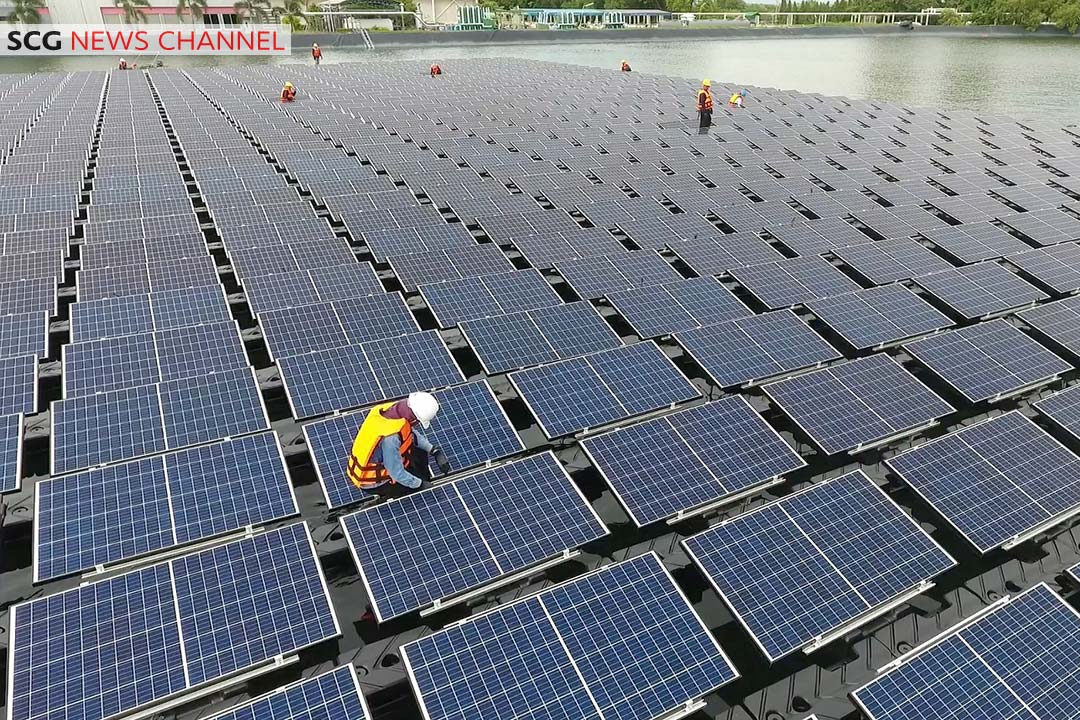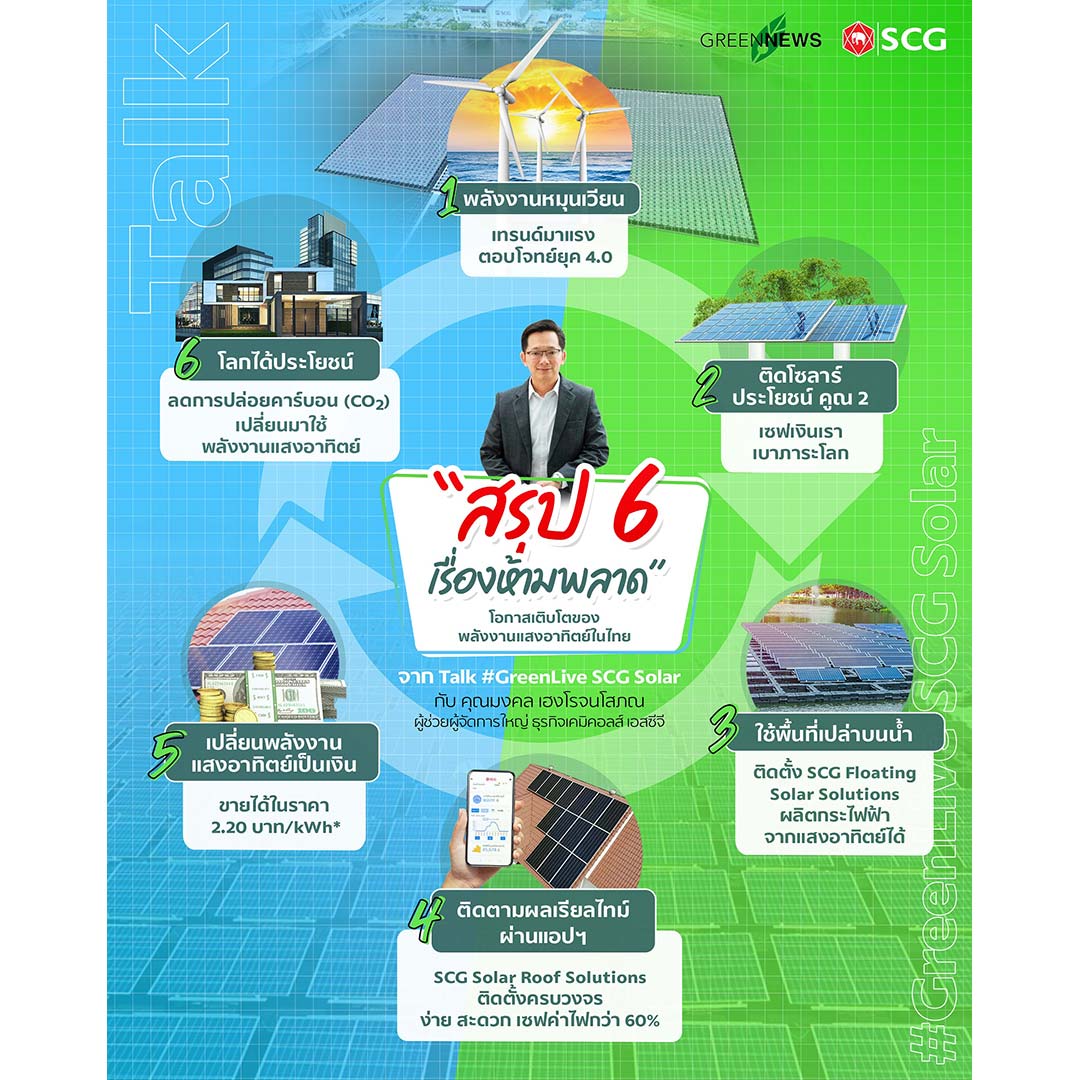Amid the COVID-19, mobility slowed down as more people stayed at home. Undeniably, working from home and the semi-lockdown measures resulted in higher household expenses, especially the electricity bill which some households suffered a 30-50% increase.
Homeowners are beginning to seek alternatives to tackle the rising electricity cost…with solar power
“At present, solar panels or solar roof installations for electricity production are cheaper than what we pay for transmission line electricity. For instance, a medium-sized single-family home with two air-conditioners and other electrical appliances such as the refrigerator and television will spend about 3,500-4,500 Baht per month on electricity. In this setting, they will be able to reduce the expenses by 1,400-1,900 Baht per month.” explains Mr. Mongkol Hengrojanasophon, Vice President, SCG Chemicals Business.
Towards Net Zero
Although in its early years in the solar power business, SCG has extensively researched and carried out the implementations internally. Recently, the R&D team rolled out innovations with durable and cost-saving features that are accredited and accepted by various organizations.
Mr. Mongkol further elaborates that SCG’s goal is sustainability in business operations, yet we are facing climate change issues that worsen to a global climate emergency. Discussions of this matter were ongoing for years from within the corporate and recently, at the end of 2020, SCG announced its advancement to be a net zero organization by 2050, aligning with assertions for the Paris Agreement international treaty. This begins by promoting employees’ awareness mindsets on the effects of climate emergency, plant machinery upgrades for the Cement-Building Materials, Chemicals, Packaging Business, and extending to the Bangsue headquarters. Moreover, renewable energy is utilized, with solar power taking the lead.
“We are dedicated to the efficient use of power, thus, we explored solar power from within the organization. This brought about expertise, knowledge of the pros and cons, which contributed to the development of Thailand’s first Floating Solar. To date, over 30 projects have acquired the Floating Solar for installation along with a 25-years warranty. The Floating Solar’s buoys can be recycled into PCR plastic pellets. They have a generation capacity of 38 megawatts, thus, reducing GHG emissions by over 26,000 tons per year. Additionally, installed SCG Solar Roof Solutions have a generation capacity of 13 megawatts which reduces GHG emission by 7,500 tons per year.” Mr. Mongkol discusses.

Nevertheless, the impression of many still perceive solar cells as costly, rather inaccessible, and involves complex technologies. Mr. Mongkol confirms that today’s business landscape has greatly shifted. In the past decade, the price of solar panels decreased by over 70-80%. Therefore, the idea of expensive and aloof solar panels is replaced by cheaper and accessible items from innovative solar power R&D.
Incentives triggering homeowners to turn to rooftop solar cells is the government’s home electricity surplus buy-back scheme. This is matched with higher daytime electricity demand in the past 1-2 years because of COVID-19.
Moreover, the industrial sector, industrial estates, businesses, agricultural sector, and governmental sector also voice higher demands for solar power installations to save cost.
SCG for solar power solutions
Owing to the diverse demands and installation locations on rooftops, on land, and on water, SCG views two main customer sectors.
- The business sector consisting of industrial plants and industrial estates that seek total solutions to alleviate electricity costs for the business owners. Moreover, some businesses own vacant spaces such as ponds, etc., and invest in the Floating Solar to reduce the evaporation rate and help with water conservation.
- The household sector including homeowners and SMEs who increased daytime power consumption during the past year, resulting in an average increase in the electricity bill of 30-50%. Homeowners now seek solutions to ease the cost by installing rooftop solar panels. Aside from the decrease in the bill, the price for the government’s purchase of surplus power, which used to be 1.68 Baht per kWh, has now reached 2.2 Baht per kWh. Thus, installing solar roofs has caught more attention from the public.

“The main concern that SCG observed about solar roof installations is worries of how to buy and install. As SCG is determined to provide total solutions, we have engineers who survey the location and determine how many solar panels can be installed and how many kWh of electricity it can generate. We offer tier 1 solar panels with finely selected, trustable technologies. This helps us rest assured that we can assist customers throughout the product’s lifespan. Also, we facilitate all permit applications and electricity sales approval. Most importantly, a solar-on-mobile tracking system is available along with a 25-years warranty for the panels and their efficiency. The benefits are prevalent as payback period is 7-10 years, afterward, consumers just enjoy the profit.” Mr. Mongkol addresses.
Mr. Mongkol further shares that SCG values quality and service, thus, we design business models that meet customer needs. For instance, for industrial plants, SCG provides teams of engineers as experienced energy consultants. This ensures optimization of the system, making the roof installations in the industrial sector enjoy a payback period of only 5-6 years.
Prospects of Thailand’s solar power
Nonetheless, considering the legal obstacles, Mr. Mongkol points out that there remain to be some limitations. An example is with the industrial plant sector wherein the electricity generator and user must share the premises. However, some plants want solar roofs but have no space while some plants have filled their roof space with the installation and can generate electricity exceeding their demand. If the government allows purchases across areas, it shall promote more solar energy generation.
To motivation the public sector, some suggestions are tax exemption from installation costs, accumulated carbon credit for sales, and better communication that can help speed up its accessibility.
“Aside from COVID-19, a recent megatrend is the carbon-neutral stance. This refers to achieving net zero carbon dioxide emissions with Thailand as part of the scheme. Many yearn for solar power but are obstructed by the inability to access it. We believe solar power is the answer, all renewable energy is the key.” explains Mr. Mongkol.

“Looking to the future, I picture smaller “power plants”. This is already happening in western countries, in Europe and the USA. I believe that Asia will adopt it as well, especially in Thailand where we are among the regional leaders in renewable energy.” Mr. Mongkol summarizes.
Solar power for the public is now accessible. We encourage all sectors, the public, industries, and the government to join hands for the preeminent value that serves the environment.
Published on: Sep 14, 2021